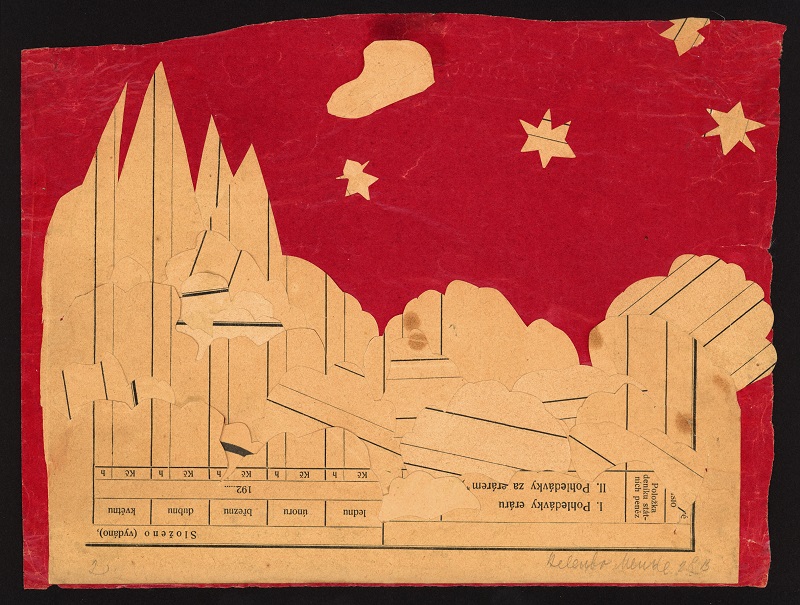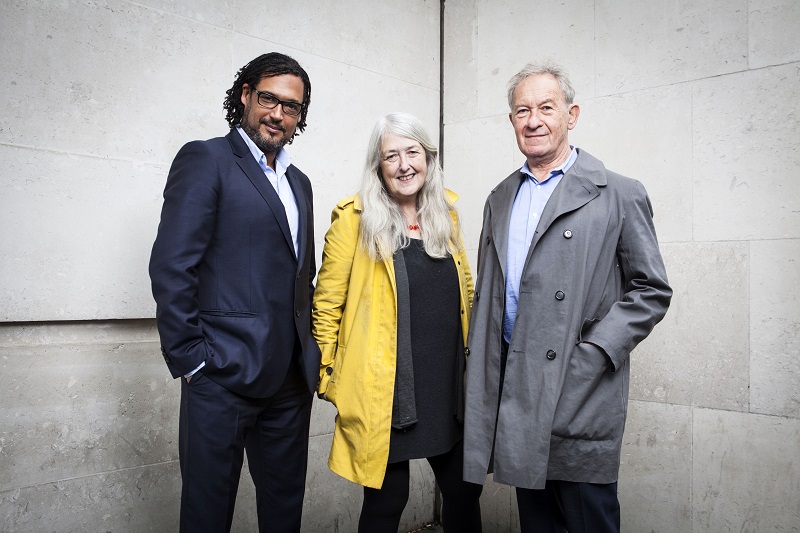Simon Schama on Civilisations: ‘We live in a great age for art’
Historian fronts epic BBC2 series on mankind's relationship with art, alongside Mary Beard and David Olusoga
Taking great care to cut out star shapes for her paper collage, 12-year-old Helena Mandlova had in her mind to create a fantasy landscape of the night sky.
But for all its charm and naivety, the dream-like picture belies the terrible truth that Helena, like 15,000 other children, was a victim of Nazi persecution and a prisoner in the overcrowded, disease-ridden barracks of Theresienstadt.
Her only escape from this oppressive reality was the time she spent learning to draw with fellow inmate and artist Friedl Dickel Brandeis – art that was ironically made from the bureaucratic forms used by the Nazis to record deportations and mass murder.
Get The Jewish News Daily Edition by email and never miss our top stories Free Sign Up
Historian Simon Schama first saw Helena’s artwork, which forms part of the 4,387 children’s drawings preserved by Dickel Brandeis at Theresienstadt and now on display at the Jewish Museum in Prague, more than 50 years ago – and says he “never forgot” the impact that collection made on him.
“If you are going to talk about the possibility of what can be done in the face of the disappearance of civilisation, there is nothing more heart-breaking, poignant and beautiful than those paintings.”
Indeed, the artwork at Theresiendstadt is in many ways a fitting starting point to our conversation about Civilisations, the new epic BBC series sweeping over thousands of years of mankind’s relationship with art, fronted by Schama, alongside Mary Beard and David Olusoga.
The nine-part series, which takes in six continents and 31 countries, was inspired by Kenneth Clark’s ground-breaking documentary series made in 1969 and aspires to be “globally panoramic”.

The 73-year-old academic, who teaches history and art history at Columbia University, describes the original series as “extraordinary”.
“I admired Civilisation for what it did for television. It famously used colour for something other than the royals, outside broadcasts and football. It stopped television in its tracks. The camera was allowed to drink in works of art and that was a wonderful thing.”
The new series is certainly ambitious in its attempts to cover a wider geographic area and span many more centuries, but so too is it more inclusive of differing opinions.
“It’s very good that there’s not one sovereign voice,” says Schama of his co-presenters. “We each have our own particular working methods and we don’t always agree – but we agree to disagree!
“I think of the three of us, I’m probably the one that thinks art is itself capable of constructing culture, that it has this irreducible power that you don’t find in anything else.”
In the first episode, Schama goes back to the very beginning, when the first known marks were made by humans in South African caves, 80,000 years ago.
He explains: “Homo sapiens had been around for a couple of hundred thousand years and then suddenly does things that are designs, that have no functional purpose whatsoever. They catered to that other part of our brain, to what makes us human beings.”
From Stone Age carvings and paintings of bison and bulls, to precious antiquities crafted by the Minoans and Mayans, Schama reveals the uniquely creative – but also conversely at times, destructive – nature of mankind.
Other episodes in the series include the depiction of nature, which takes Schama on a journey from 10th-century China, where he looks at the scrolls of the Song dynasty, to the country villas of the Renaissance and the dramatic expanse of the American landscape, as well as an episode about the importance of colour.
The final episode of the series, which begins and ends with the artwork from Theresienstadt, was for Schama the most personally fulfilling, albeit “very, very intense” to work on.

He tells me: “Looking at those paintings again after 50 years was tough and at times it was hard to hold it together.”
The film also includes an interview with modern Israeli artist Michal Rovner, who has created a series of installations made from the stones of demolished Israeli and Palestinian houses.
Known as “makom”, meaning “place” in Hebrew, Schama describes her work as “very beautiful and moving” and reveals that he would love to bring the installation, which has previously been displayed in New York and Paris, to the Royal Academy in London.
Schama speaks animatedly and with huge passion about his favourite subject, prompting me to ask where his love for art stems from.
“My parents took me to museums quite early on,” he recalls. “I remember, aged 7, seeing an incredible self-portrait by Rembrandt of when he was an old man and finding it very moving.
“I probably don’t have a deep answer, but I’ve always been amazed how some historians see art as just an illustrative document, while for others it is really something that makes the world the way it is. I’ve always thought the latter.”
He adds: “For me, great art has a physically visceral impact. During filming in Moscow, I came across Picasso’s cubist portrait of Ambroise Vollard. I had seen it 20 years ago, but was still thunderstruck by how moving and extraordinary it was.
“The cubist portrait was all broken up and fractured, but somehow the power of the person being depicted still came rolling through in a way that words could not have conveyed.”
As for the future, Schama believes “we are living in a great age for art” and is certain that mankind’s creative impulse will long continue.
“Ever since we did hand stencils inside the cave, all the makings of the visual, creative imagination arrived – and they still haven’t gone.”
Civilisations continues Thursday 15 March (tonight), 9pm on BBC2

Thank you for helping to make Jewish News the leading source of news and opinion for the UK Jewish community. Today we're asking for your invaluable help to continue putting our community first in everything we do.
For as little as £5 a month you can help sustain the vital work we do in celebrating and standing up for Jewish life in Britain.
Jewish News holds our community together and keeps us connected. Like a synagogue, it’s where people turn to feel part of something bigger. It also proudly shows the rest of Britain the vibrancy and rich culture of modern Jewish life.
You can make a quick and easy one-off or monthly contribution of £5, £10, £20 or any other sum you’re comfortable with.
100% of your donation will help us continue celebrating our community, in all its dynamic diversity...
Engaging
Being a community platform means so much more than producing a newspaper and website. One of our proudest roles is media partnering with our invaluable charities to amplify the outstanding work they do to help us all.
Celebrating
There’s no shortage of oys in the world but Jewish News takes every opportunity to celebrate the joys too, through projects like Night of Heroes, 40 Under 40 and other compelling countdowns that make the community kvell with pride.
Pioneering
In the first collaboration between media outlets from different faiths, Jewish News worked with British Muslim TV and Church Times to produce a list of young activists leading the way on interfaith understanding.
Campaigning
Royal Mail issued a stamp honouring Holocaust hero Sir Nicholas Winton after a Jewish News campaign attracted more than 100,000 backers. Jewish Newsalso produces special editions of the paper highlighting pressing issues including mental health and Holocaust remembrance.
Easy access
In an age when news is readily accessible, Jewish News provides high-quality content free online and offline, removing any financial barriers to connecting people.
Voice of our community to wider society
The Jewish News team regularly appears on TV, radio and on the pages of the national press to comment on stories about the Jewish community. Easy access to the paper on the streets of London also means Jewish News provides an invaluable window into the community for the country at large.
We hope you agree all this is worth preserving.
-
By Laurent Vaughan - Senior Associate (Bishop & Sewell Solicitors)
-
By Laurent Vaughan - Senior Associate (Bishop & Sewell Solicitors)
-
By Laurent Vaughan - Senior Associate (Bishop & Sewell Solicitors)
-
By Laurent Vaughan - Senior Associate (Bishop & Sewell Solicitors)





















